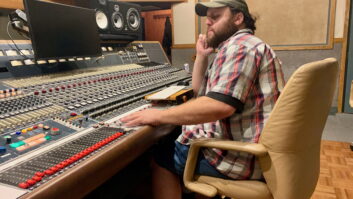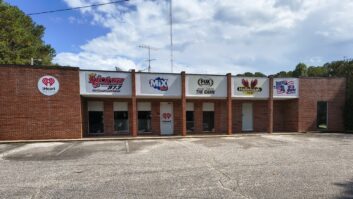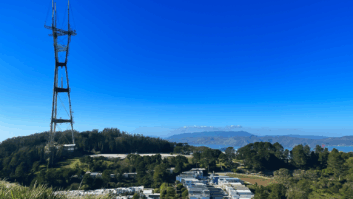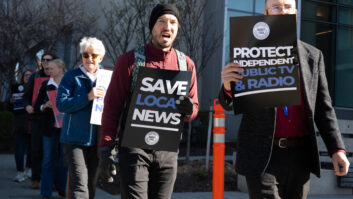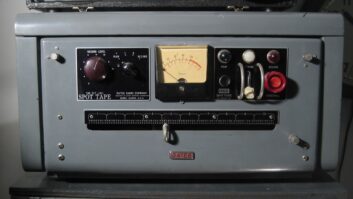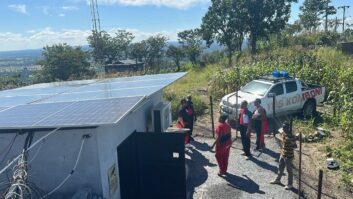STANLEY, Falkland Islands — It’s been nearly three decades since this archipelago located about 300 miles east of Argentina and 680 miles north of Antarctica was thrust into the news with the start and finish of the Falklands War.
Since then, the world has moved onto other things, but life goes on for the approximately 3,140 residents of East Falkland and West Falkland Islands — and the local radio station that serves them, the Falkland Islands Radio Service (FIRS).

From left: ‘Breakfast Show’ presenter Trina Berntsen, Station Controller Corina Goss, News Editor Stacy Bragger, Administrative Officer Chris Peck and Program Controller Liz Elliot In one form or another, radio has existed here in the South Atlantic since 1929. But even now, in the Internet Age, FIRS remains the Falklands’ only local broadcaster, with its service supplemented by stations operated by the BBC (radio only) and the British Forces Broadcasting Service (radio and satellite TV).
“We offer a diverse range of music, news and programming aimed at the entire community from young children through to retired adults,” said FIRS Station Controller Corina Goss.
BORN FROM ‘THE BOX’
FIRS — also known as Falklands Radio — began in 1929 as a wired, not wireless, service. Local homes were equipped with loudspeakers connected by dedicated overhead lines — or, the cases of farms, via telephone line — to an amplifier and studio located on Ross Road, in the capital city of Stanley. The content consisted of 78 rpm music records, local news and a program produced/hosted by the islands’ governor, Sir Arnold Hodson.
Because there were no dials to be tuned, the then-named Falkland Islands Broadcasting Services (FIBS) was known simply as “The Box.” It stayed in service through the 1982 Falklands War, but was eventually phased out later in the decade.
A 5 kW AM transmitter was installed for FIBS in 1954; a year later, the broadcaster moved to its current location on John Street in Stanley.
Initially, the FIBS was owned and operated by the government. In August 2005, managerial control was transferred to an arm’s-length agency known as the Media Trust, and the name changed to its current Falkland Islands Radio Service. Currently, FIRS is heard throughout the islands on 530 kHz and in smaller areas via six different FM transmitters.
FIRS TODAY
The original Falklands Radio may have been technologically primitive, but the 21st century version is quite up to date.
“We have two fairly sizable studios, which are only approximately three years old,” said Goss. “We have 24 hour Internet access and stream our locally produced programming online. We have a large music library consisting of CDs and a large quantity of vinyl, which still gets the occasional outing. Most of our music is now stored digitally on a Dalet system,” she said.
“Our broadcasting hours have extended considerably and we have introduced a wider range of local programming including specialized shows. We have also had all of the equipment upgraded and now have an island-wide medium-wave frequency and there are plans in place for an island-wide FM facility also. In the past we shared an FM network with BFBS.”

The FIRS main studio and extensive record library. The station is staffed by five full-time employees. In addition to Goss, there are Program Controller Liz Elliot, News Editor Stacy Bragger, Junior Reporter Layla Crowie and Administrative Officer Chris Peck; most of whom work on-air as well.
“We also employ a number of freelancers,” said Goss. “We usually have approximately 15 freelancers on the books, and these people tend to work during the evening and weekend hours.” The station is government-funded, with its budget bolstered by about £25,000 in annual advertising revenue.
WHAT’S ON
Programming on FIRS is a mix of music, talk, news, community announcements, weather and everything else that helps keep this isolated community in touch with itself and the world.
“Some of our music is brought in and some locally produced,” said Goss. “Our news is locally produced. We also supplement our own programming with content from the BBC.”
Make no mistake: There is lots of local content to cover in the Falklands.
FIRS’ programming includes live events such as darts tournaments — “Darts could be described as the national sport here,” Goss said — participation in overseas events such as Commonwealth Games and the NatWest Island Games; and local sports such as horseracing and motocross. FIRS also broadcasts meetings of the Legislative Assembly, fundraising on-air auctions — “Last year we raised approximately £23,000 for the local museum during an auction and ‘fun day’ which lasted for about six hours,” school events, outdoor broadcasts from local parades and “annual anniversaries, particularly related to the 1982 war.”

Another studio interior view. The FIRS weekday broadcast schedule runs 7 a.m. to 1 p.m., and then from 4 to 10 p.m., with the other slots being filled by BBC World Service (via satellite). Saturdays are locally sourced from 9 a.m. to noon, then 5 to 10 p.m. On Sundays, FIRS has local programming (including “Accordionly Yours with Derek Howatt”) from 5 to 10 p.m. All other times are filled with the BBC World Service.
Compared to decades past, FIRS has a relatively easy time of producing programming. Pop music and other content is available via satellite; either by direct downlink or via the Internet. Before these connections were available, the service had to make do with whatever records/tapes and local talent it had at hand, supplemented by BBC WS over the notoriously temperamental shortwave radio bands.
CHALLENGES
Still, other challenges remain, like on-air talent: “In such a small community it is not always easy to find people with both an interest in and a natural ability for broadcasting,” said Goss. “So whenever somebody comes along matching that description we tend to snap them up quickly.”
This said, “The biggest challenge is probably the fact that we are both a local and a national broadcaster,” she said. “This means that we have to attempt to meet the needs of people from all backgrounds and of all ages. Our programming reflects the diversity that is needed to do this.”
Today, FIRS has a solid base in the Falkland Islands, and its international audience is growing thanks to streaming audio. “We have more than 800 users registered on our website,” said Goss. “But there are ways to listen online without registering, so the amount of listeners could be higher than that.”
As for the future? Goss’ dream is “to have our FM network extended island-wide, and eventually to extend our broadcasting hours,” she said. “It is not possible in the immediate future, but one day it would be great to see the station broadcasting 24 hours a day.”
In the meantime, the staff at FIRS continue to enjoy their unique role, broadcasting to family and friends from the base of the world.
“The biggest benefits of doing radio in the Falklands are the enjoyment gleaned from the work here and the interaction with the community,” said Program Controller Liz Elliott. “There’s nothing quite like it.”
